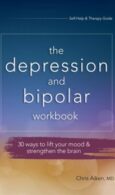Dealing with Family Tensions

Some people with bipolar disorder comment that the experience of being high has caused damage to their relationships. Apart from being more irritable, part of the nature of being high is to be more expansive in mood, more distractible and more sociable. Some people with bipolar disorder spend large sums of money in a manic state and get into debt. Others, being distractible, may not accomplish tasks at work or at home and may lose their jobs. Contact with people can become more rewarding than usual for some people and they may tend to be flirtatious or possibly have an affair.
Equally, being depressed can cause problems, but of a different kind. People can become tearful or pessimistic. They may also withdraw from others, including their family and become much less active. All of these issues can cause problems. Whether the person is hospitalised or not, it can be almost impossible for them to continue with their day-to-day commitments during a period of moderate to severe depression.
In bipolar disorder, therefore, there are two types of problems that can afflict the person who has bipolar disorder and their families. Having to cope with the problems of both depression and mania can be harder to understand for carers and spouses than dealing with depression in isolation. Episodes can cause problems for the family or relationship. Some symptoms of both depression and mania can be perceived as malicious or intentional, when often they are not.
Clinical professionals can have a role in the rebuilding of relationships placed under strain, helping families to be educated about the symptoms of the illness so that they do not perceive the behaviour of their friend or relative when ill as being malicious or lazy. When the person with bipolar disorder is well, it may be helpful to try to clear up any misunderstandings and mend any ill feelings that might have arisen. This may be in the context of ongoing therapeutic work with the individual who may wish to invite their partner to therapy sessions. Work on communication skills can be very important. Couples can find it useful to discuss each other’s feelings about their experiences in order to help them to process the sometimes conflicting and powerful emotions that both may have concerning previous experiences. It may also be useful to engage in more activities that they both value, including gestures from both sides to show their appreciation of one another and to help strengthen the relationship.
At times some family members may feel somewhat resentful if they feel that an episode of illness in their relative is caused by them stopping their mood stabilisers. This can be a tricky issue as it may cause some people to feel that their relative or loved one is being irresponsible. Family education can be useful here. As a professional I often attempt tp make it clear that sometimes it is hard to judge whether someone has stopped taking their medication and then relapsed or whether they were in an early stage of relapse when they stopped taking the medication.
Some families can remain resentful over the behaviour of their relative, despite an explanation of the illness. In these circumstances, I often find a family meeting can be called for to facilitate a frank discussion of feelings. Particularly the meaning associated with being on long term medication should be explored within the family.
Issues with children can be complicated. If the illness started later in life, the children of someone with bipolar disorder may remember what their parent is usually like and can easily identify behaviour that may be the result of the illness. However, it can be more difficult for children to differentiate such behaviour from ‘normal’ behaviour if their parent has few periods without symptoms. Here it may be useful for the other parent to educate the children about the illness if possible. Support from extended families can be of tremendous help.
Husbands, wives and families – getting involved
Spouses and partners can be of great support. Some husbands or wives may have married their partner in the full knowledge that they have bipolar disorder and have accepted it. However, it can be the case that bipolar disorder becomes apparent after the relationship becomes established. This can mean a lot of grief and anger for both partners as they try to come to terms with both the life they had envisaged together and the changes wrought by the onset of enduring mental illness. Distress can be particularly acute if a partner enters into a relationship having not been told about their partner’s illness. Again, it is important to respect the views of both partners is these situations to try to work towards a situation in which communications between partners serve to facilitate progress rather than perpetuate conflict. In addition, it is often the case that spouses get very little information and support from mental health services. This can lead to them struggling alone with difficult challenges and so experience distress. Including your partner or significant other in the therapy process is an important part of coming to terms and adjusting to diagnosis.
When relationships within the family are positive there is great potential for support for people with bipolar disorder. Some people give their credit cards to their spouses when they feel their mood elevated to keep it until they no longer feel ‘high’. Power of attorney can also be given to the spouse so that the spouse can be entrusted to take the correct action to prevent financial problems. However, all families are different. Power of attorney can be a sensitive issue. It is not recommended for every family. Any powers or agreements within the family that could be seen to be restrictive by the person with bipolar disorder need to be treated with caution. It is extremely important that prior consent is given when the person with bipolar disorder is not in a period of mania or severe depression and that the terms under which such restrictions might operate are clear and agreed by both sides. If this type of approach is agreed in these circumstances, with the person with bipolar disorder fully aware of the role that these restrictions might play in avoiding harm, it can work very well. If, however, the restrictions are in some way imposed on the person with bipolar disorder in a way that does not seem fair to them it may become a further source of difficulty and tension.
Family members can have a vital role in helping people with bipolar disorder to notice early signs of relapse so that they can use psychological skills to avert further problems or seek help from their mental health team. However, a balance needs to be drawn between this positive role and the risk of friction between family members if they are seen to be over-sensitive to even small changes in the behaviour of the person with bipolar disorder. This balance involves recognition that all people experience fluctuation mood states, including anger, happiness, frustration, boredom and excitement. Thus evidence of irritability in someone with a diagnosis of bipolar disorder is not necessarily a sign of anything more than their being irritated by an event in a normal way. When family members can communicate about these issues they can pool their knowledge to identify changes that are significant for the individual and those that are normal variation. This is where I find using a well being plan that the whole family can use that describes early warning signs can be of great benefit.
If you ‘d like more information on this topic there is a wonderful resource here: https://bipolarcaregivers.org/








